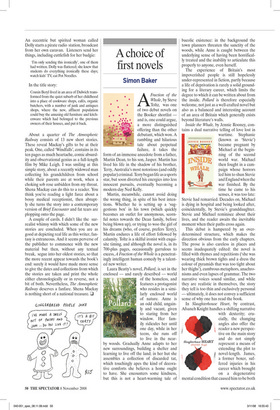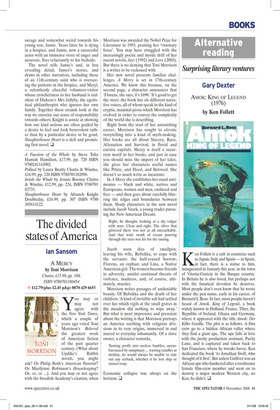A choice of first novels
Simon Baker
AFraction of the Whole, by Steve Toltz, was one of two debut novels on the Booker shortlist — and is, one could argue, a more distinguished offering than the other debutant, which won. A rambling and hilarious tale about perpetual failure, it takes the form of an immense anecdote from a father, Martin Dean, to his son, Jasper. Martin has lived his life in the shadow of his brother, Terry, Australia’s most notorious (and oddly popular) criminal. Terry began life as a sports star, but soon diverted his energies into less innocent pursuits, eventually becoming a modern-day Ned Kelly.
Martin, meanwhile, cannot avoid doing the wrong thing, in spite of his best intentions. Whether he is setting up a ‘suggestions box’ in his town (which quickly becomes an outlet for anonymous, scornful notes towards the Dean family, before being blown up), or trying to woo the girl of his dreams (who, of course, prefers Terry), Martin endures a life of effort followed by calamity. Toltz is a skilful ironist with exquisite timing, and although the novel is, in its 700-plus pages, occasionally garrulous to excess, A Fraction of the Whole is a penetratingly intelligent human comedy by a talented new writer.
Laura Beatty’s novel, Pollard, is set in the enclosed — and rarely described — world of the homeless, and features a protagonist who resides in a similarly enclosed world of nature. Anne is an odd child, ungainly and vacant, given to staring from her window. Her family ridicules her until one day, while in her teens, she runs off to live in the nearby woods. Gradually Anne adapts to her new surroundings, building a shelter and learning to live off the land; in her hut she assembles a collection of discarded tat, which touchingly apes the kind of decorative comforts she believes a home ought to have. She encounters some kindness, but this is not a heart-warming tale of bucolic existence: in the background the town planners threaten the sanctity of the woods, while Anne is caught between the underlying sense of having been horrifically treated and the inability to articulate this properly to anyone, even herself.
The experience of Britain’s most impoverished people is still hopelessly under-represented in fiction, partly because a life of deprivation is rarely a solid grounding for a literary career, which limits the degree to which it can be written about from the inside. Pollard is therefore especially welcome, not just as a well-crafted novel but also as a balanced and interesting account of an area of Britain which generally exists beyond literature’s walls.
Inside the Whale, by Jennie Rooney, contains a dual narrative telling of love lost in wartime. Stephanie (known as ‘Stevie’) became pregnant by Michael at the beginning of the second world war. Michael then fought in a campaign whose horrors led him to shun Stevie and England when the war finished. By the time he came to his senses, it was too late: Stevie had remarried. Decades on, Michael is dying in hospital and being looked after, coincidentally, by Stevie’s granddaughter. Stevie and Michael reminisce about their lives, and the reader awaits the inevitable moment when their paths cross again.
This debut is hampered by an overdetermined structure, which makes the direction obvious from the early chapters. The prose is also careless in places and seems inadequately edited: the novel is filled with rhymes and repetitions (‘she was wearing thick brown tights and a dress the colour of pyramids that was too tight about her thighs’), cumbrous metaphors, anachronisms and even lapses of grammar. The two narrative voices sound similar, and while they are realistic in themselves, the story they tell is too thin and exclusively personal — ultimately, it does not convey a sufficient sense of why one has read the book.
In Slaughterhouse Heart, by contrast, Afsaneh Knight handles a shifting narrative with dexterity; crucially, the changing angles also offer the reader a new perspective on the main story and do not simply represent a means of extending the plot to novel-length. James, a former boxer, suffered injuries in his career which brought on a degenerative mental condition that caused him to be both savage and somewhat weird towards his young son, Jamie. Years later he is dying in a hospice, and Jamie, now a successful actor with an immense store of anger and neurosis, flies reluctantly to his bedside.
The novel tells Jamie’s and, in less revealing detail, James’s stories, and draws in other narratives, including those of an 11th-century saint who is overseeing the patients in the hospice, and Meryl, a relentlessly cheerful volunteer-visitor whose crotchetiness to her husband is redolent of Dickens’s Mrs Jellyby, the egotistical philanthropist who ignores her own family. Together these strands look at the way we exercise our sense of responsibility towards others; Knight is astute at showing how our kind actions are often guided by a desire to feel and look benevolent rather than by a particular desire to be good. Slaughterhouse Heart is a deft and promising first novel. ❑ A Fraction of the Whole by Steve Toltz Hamish Hamilton, £17.99, pp. 720 ISBN 9780241143902.
Pollard by Laura Beatty Chatto & Windus, £16.99, pp. 320 ISBN 9780701182090. Inside the Whale by Jennie Rooney Chatto & Windus, £12.99, pp. 224, ISBN 9780701 82731.
Slaughterhouse Heart by Afsaneh Knight Doubleday, £16.99, pp. 307 ISBN 9780 385614122.



















































































 Previous page
Previous page